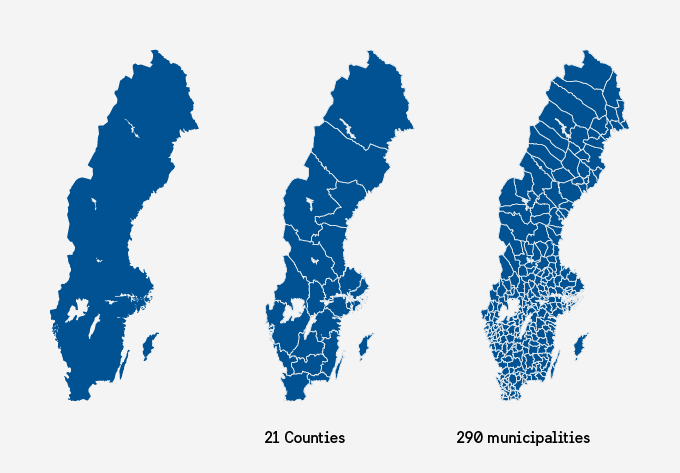Accessibility
Instead of reading off statistics, I decided to include the perspectives of two people, each with a disability, currently living in Sweden. Personal stories often tell a truer tale than do statistics on a page.

Jesper Odelberg
First, Jesper. Jesper has limited mobility due to living with cerebral palsy and uses a wheelchair every day. Interestingly, Jesper is a stand-up comedian! He’s said himself that “attitudes toward people with disabilities have improved” since he began his career in 1997 (Wermeling, 2016). This was a positive note, as it appears the perception of people have changed in a positive light. When asked about accessibility in Sweden’s public spaces, he says that in his hometown of Gothenburg the curbs of sidewalks have been beveled for wheelchairs, and he feels the spaces in general have been improved for wheelchair users; however, there are still cobblestone streets frequent in certain areas that are not “practical” for someone with a disability (Wermeling, 2016). Jesper explains how although Sweden has initiated taking steps toward accessibility for all, there is still a ton of improvement to be made.

Veronica Hedenmark
Next, Veronica. Veronica uses an electric wheelchair and considers it a “human right” to be able to get into town, access restaurants, and use public transportation like everyone else, instead of having to use special services for the disabled (Wermeling, 2016). She is the part-owner of a personal assistance firm that has office locations dispersed around Sweden. She takes rail transportation and insists that she frequently “has problems” with this service, as the wheelchair lifts have been turned off quite often, making it extremely difficult to take the rail. Veronica explains how she feels as though this is discrimination, and her “physical disability causes [her] mental stress” (Wermeling, 2016). This is just one of the struggles that Veronica faces due to her disability and the lack of accessibility for all. She feels as though “Sweden often boasts” about the updates it’s making for accessibility, but there is not much to show for it.
After reviewing the comments and opinions of actual Swedish residents, it appears the country still has major improvements to make, at least in these areas. The changes should be made a top priority because every person has a right to public spaces and services despite the disabilities they may have.
Healthcare
Healthcare in Sweden is based upon an equal-access system. Healthcare itself as well as the economic responsibility is shared and regulated among the central government, county councils and municipalities (Sweden, 2018). It’s open for discussion whether or not this universal healthcare initiative is one of the causes of Sweden having one of the largest elderly populations in Europe, as well as their increasing average life span (81 males, 84 females) (Sweden, 2018).

In regard to accessing mental health services, what I was able to find was that there are 3, 244 psychiatric beds in general hospitals per every 100,000 members of the population in Sweden (WHO, 2011). At first glance, it seemed somewhat of a small number; however, statistics show that there were 988 admissions to psychiatric beds in general hospitals per every 100,000 members of the population (WHO, 2011). So, it appears as if access to psychiatric services, at hospitals anyway, is readily available.
One of the things I’ve found most interesting regarding mental healthcare in Sweden, as I touched on earlier in this blog, is the fact that primary doctors are able to prescribe or continue prescribing psychotherapeutic drugs (WHO, 2011). Personally, I feel that that makes access to mental health services much more available as opposed to only allowing specialist doctors to prescribe. Although Sweden gives their primary doctors this ability, it should be noted that “official referral procedures for referring persons from primary care to secondary/tertiary care” do exist, as well as vice versa (WHO, 2011). So, if a specialist is most definitely needed, a referral will be granted; whereas if a specialist is visited first, and a primary doctor is believed to be able to properly care for this person, a referral will be granted for that as well.
Overall, Sweden’s general healthcare system, the equal-access system, provides access to most, if not all, healthcare needs regardless of that persons status. This plays a large role in accessing healthcare, because in other countries, such as ours, most people are limited to what their specific insurance carriers will cover, often limiting them greatly. Sweden’s use of their primary doctors to assist in managing mental health prescriptions also plays a role in widening access to these services. I believe Sweden has a firm grasp on ensuring its citizens are well taken care of.
Advocacy
The Swedish National Association for Social and Mental Health (RSMH)
- This organization is part of the international mental health service user and survivor movement. It is also part of the Swedish Disability Federation.
- Contact information: telephone- 08-12 00 80 40; E-mail- rsmh@rsmh.se
Swedish Disability Rights Federation
- The federation was founded 1942 and consists today of 41 national disability organizations. Each organization makes its own decisions and determines its own activities.
- Contact information: telephone- 46-8-546 404 00; E-mail- info@funktionsratt.se
The Swedish Handicap Institute
- National resource center on assistive technology and accessibility for persons with disabilities.
- Contact information: telephone- 46 8 620 17 00; E-mail- info@hi.se
The Swedish National Association for Persons with Intellectual Disability (FUB)
- This is a non-profit advocacy organization working to enable children, adolescents, and adults with intellectual disabilities to lead a prosperous life.
- Contact information: telephone- 08-508 866 00; E-mail- fub@fub.se
References
Sweden. (2018). Healthcare in Sweden. Retrieved from https://sweden.se/society/health-care-in-sweden/
Wermeling, E. (2016). Hedenmark, entrepreneur and role model. Retrieved from https://sweden.se/collection/improving-accessibility/article/odelberg-comedian-and-musician/
Wermeling, E. (2016). Odelberg, comedian and musician. Retrieved from https://sweden.se/collection/improving-accessibility/article/odelberg-comedian-and-musician/
WHO, Department of Mental Health and Substance Abuse. (2011). Sweden. Retrieved from http://www.who.int/mental_health/evidence/atlas/profiles/swe_mh_profile.pdf
Leave a Reply